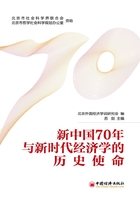
参考文献
[1]哈伯勒.繁荣与萧条:经济周期运动的盛衰交替[M].朱应庚,译.北京:中央编译出版社,2011.
[2]汉兹.开放的经济学方法论[M].段文辉,译.武汉:武汉大学出版社,2009.
[3]吉尔迪,阿米蒂奇.历史学宣言[M].孙岳,译.上海:格致出版社、上海人民出版社,2007.
[4]贾根良.报酬递增经济学:回顾与展望(1)[J].南开经济研究,1998(6).
[5]贾根良.中国经济学革命论[J].社会科学战线,2006(1).
[6]贾根良.“新经济思想史”刍议[J].社会科学战线,2010(1).
[7]赖纳特,达斯特.替代性教规:文艺复兴经济学史[M]//穷国的国富论:演化发展经济学论文选(上卷).贾根良,主编.贾根良,等,译.北京:高等教育出版社,2007.
[8]劳丹.进步及其问题(第2版)[M].刘新民,译.北京:华夏出版社,1998.
[9]李黎力.“明斯基时刻”之考辨[J].经济理论与经济管理,2013(7).
[10]李黎力.“大衰退”以来明斯基思潮之动向——一个批判性评述[J].经济评论,2014(1).
[11]李黎力.明斯基的“华尔街图景”[J].政治经济学评论,2017(5).
[12]李黎力.明斯基的经济学研究方法论[J].当代经济研究,2017(6).
[13]李黎力.明斯基金融不稳定性假说评析[J].国际金融研究,2017(6).
[14]李黎力.明斯基与主流经济学:渊源与分化[J].经济理论与经济管理,2017(7).
[15]李黎力.明斯基经济思想研究[M].北京:商务印书馆,2018.
[16]李黎力.“明斯基时刻”的前世今生[N].经济日报,2018-01-31.
[17]李黎力.经济学研究的范式及演进[M]//PPE导论.姚新中,主编.北京:中国人民大学出版社,2019.
[18]李黎力.明斯基与后凯恩斯主义:渊源和比较.中华外国经济学说研究会年会会议论文,2019.
[19]李黎力,贾根良.经济思想编史学:学科性质、内容与意义[J].经济学动态,2017(11).
[20]李黎力,沈梓鑫.经济学向何处去——金融危机以来的经济学反思[J].经济理论与经济管理,2012(7).
[21]李黎力,张红梅.明斯基研究传统:经济学所忽视的金融泡沫研究传统[J].经济学家,2013(9).
[22]罗斯巴德.亚当·斯密以前的经济思想:奥地利学派视角下的经济思想史(第一卷)[M].张凤林,等,译.北京:商务印书馆,2012.
[23]斯诺登,文.宏观经济学百科词典[M].安佳,等,译.南京:江苏人民出版社,2011.
[24]特维德.逃不开的经济周期[M].董裕平,译.北京:中信出版社,2012.
[25]夏佛林.经济周期[M]//新帕尔格雷夫货币金融大辞典(第一卷).纽曼,米尔盖特,伊特韦尔,主编.王曙光,译.北京:经济科学出版社,2000.
[26]ANDERSON, GARY, ROBERT TOLLISON. Dead Men Tell No Tales[J]. History of Economics Society Bulletin, 1986, 8(1): 59-68.
[27]BLAUG, MARK. History of Ideas, Please, We're Economists[J]. Journal of Economic Perspectives, 2001, 15(1): 145-64.
[28]CESARANO, FLIPPO. On the Role of the History of Economic Analysis[J]. History of Political Economy, 1983, 15(1): 63-82.
[29]DAVIS, JOHN. Mark Blaug on the Historiography of Economics[J]. Erasmus Journal for Philosophy and Economics, 2013, 6(3): 44-63.
[30]HEILBRONER, ROBERT. Modern Economics as a Chapter in the History of Economic Thought[J]. History of Political Economy, 1979, 11(2): 192-198.
[31]KING J E. Post Keynesian Economics[Z]//The New Palgrave Dictionary of Economics (3rd edition). London: Palgrave Macmillan, 2018: 10520-10532.
[32]KURZ, HEINZ. Whither the History of Economic Thought? Going Nowhere Rather Slowly?[J]. The European Journal of the History of Economic Thought, 2006, 13(4): 463-488.
[33]LEE, FREDERIC S. Heterodox Economics[Z]//The New Palgrave Dictionary of Economics (3rd edition). London: Palgrave Macmillan, 2018: 5790-5796.
[34]LEIJONHUFVUD, AXEL. The Use of the Past. Invited Lecture at the Meetings of the European Society for the History of Economic Thought. Portugal: O-porto, 2006-04.
[35]MEDIO A. Trade Cycle[Z]//The New Palgrave Dictionary of Economics (3rd edition). London: Palgrave Macmillan, 2018: 13744-13754.
[36]ROMER, PAUL. The Trouble with Macroeconomics[J]. The American Economist, 2019.
[37]RONCAGLIA, ALESSANDRO. Why should Economists Study the History of Economic Thought?[J]. The European Journal of the History of Economic Thought, 1996, 3(2): 296-309.
[38]TOBIN, JAMES. Comments on“Stabilize an Unstable Economy”[J]. Journal of Economic Literature, 1989(3): 105-108.
[39]ZARNOWITZ, VICTOR. Recent Work on Business Cycles in Historical Perspective: A Review of Theories and Evidence[J]. Journal of Economic Literature, 1985, 23(2): 523-580.
(1)本文系教育部“党的创新理论引领贯穿理论经济学知识体系研究”重大专项课题(19JZDZ002)的阶段性成果。
(2)李黎力,中国人民大学经济学院副教授,经济学博士。
(3)关于库恩的“范式”理论在经济思想史当中的应用,可参见李黎力(2019a)。